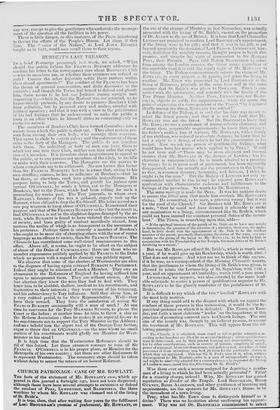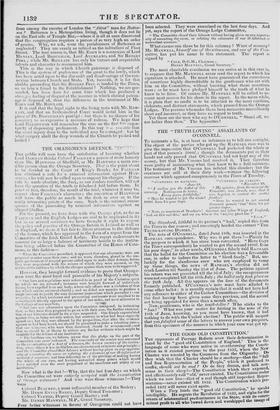CHURCH PATRONAGE : CASE OF MR. ROWLATT.
THE facts of the statement of Mr. RoweArr's case, which ap- peared in this journal a fortnight ago, have not been disproved ; although there have been several attempts to extenuate or defend the conduct of PEEL, LYNDHURST, and BLOMFIELD, the three worthies by whom Mr. Rowletre was choused out of the living of St. Bride's.
It is true, then, that after waiting four years for the fulfilment of Lord BROUGHAM'S promisee of preferment, Mr. RowLATT, on
the eve of the change of Ministry in last November, was actually presented with the living of St. Bride's, vacant on the promotion of 1)r. ALLEN to the see of Bristol. It is true that Lord Chancellor
Lvsnmeasy promised to confirm Lord BROUGII AM'S appointment, if the living were ill his gift ; and that it was ill his gift, is put
beyond question by the decision of Lord ELnoN. Lvxonuasy, how-
ever, doubtless for weighty reasons, thought proper to break this promise, and transfer his right of nomination to Sir ROBERT PEEL, then Premier. PEEL told Bishop BLOMFIELD to select from among the Linden curates, the fittest man ; regardless of the equitable (and it is said the legal) right of Mr. Rosvr. IT to the living. The Bishop contemptuously rejects the claim of Mr. RowLsry, in every respect a fit person, and gives the living to another. Mr. EDEN was presented by Lord Bitouantat to the living of Battersea, precisely at the same time and in the same manner that St. Bride's was given to ROM% A.TT. EDEN is C011- DaeIed With the aristocracy, and remotely with the family of the Tory Prime Minister. Neither PEEL, LYsinouner, nor BLOM- FIELD, objects to ratify his appointment ; while (to quote the pointed expression of a correspondent of the Thnes) " by a general shuttle among the three, Row Lars was robbed!" In defence of the Bishop, it is said that his duty was merely to select the fittest person; and that it is not his fault that Mr. ROWLATT was not the fittest. But Dr. BLOMFIELD knew that Mr. RowLATT was a gentleman of unimpeachable character, and of more than respectable acquirements: he knew that, owing to his father's sudden loss of fortune, Mr. Rowserr, with a flimily of ten children, was reduced to absolute distress; he knew that he had a right to a living, of which he had the presentation in his pocket. Now we ask any person of gentlemanly feelings, what would have been his course when applied to by PEEL? Would he not have said—" There may be more eloquent and learned curates than Mr. ROWLATT in the diocese of London ; but his character is unimpeachable: he is witch admired as a preacher by many; lie is in great need of pretimnent, has been repeatedly disappointed, and has actually got the presentation to the living; so that, in common decency, humanity, and fairness, I think he ought to be the man." But the Bishop of LONDON not only re- commended another to the living; he rejected poor RoweATT's application with characteristic rudeness and indifference to the feelings of the powerless. So much for Dr. BLOMFIELD. The same apotcgy is made for PEEL. It was his anxious desire to secure theft/test man that made him overlook Mr. Row Leer's claims. He committed, to be sure, a grievous wrong; but it was for the good of the Church I Sir ROBERT told Mr. ROWLATT in a note, " that lie could not have deetned it advisable to make any nomination to a living, circumstanced like St. Bride's, which could not have insured the constant personal duties of the incum- bent." The Times, in remarking upon this, adds- " If the spiritual interests of the parish of St. Bride are to have any weight in determining the question of the selection of a minister, there can, we appre- hend, be little doubt that the appointment of Mr. Dale to be the resident minister of the parish, personally discharging the duties of the cure, was pre- ferable to the giving of the living to Mr. ROWLATT, to be held by him in conjunction with his Preachership at the Temple, the main duties of St. Bride's devolving on a curate."
But was Mr. ROWLATT offered St. Bride's, which is worth 400/, a year, if he would give up his Readership, which is worth DM/. ? That dues not appear. And what arc we to think of this excuse, if it be true, as a correspondent of the Morning Chronicle asserts, that the gentleman to whom the living of St. Bride's was given, is allowed to retain the Lectureship of St. Sepulchre, with 1301. a year, and an appointment at Cambridge, worth 1001. a year more?
LYNDHURST, we suppose, was also actuated by the same laud- able solicitude to secure a person of qualifications superior to Mr. Rowitetris to be the ghostly comforter of the parishioners of St. Bride's.
It is difficult to say which of the trio " bustled" ROWLATT with the most holy motives. If any thing could add to the disgust with which we regard the conduct of these persons in this transaction, it would be the hy- pocritical pretence on which it is defended. The Times, on Tues- day, put forth a most elaborate " leader " on the importance at this juncture of promoting eminent men to Church livings. The real aim of the homily was, though by an indirect process, to excuse the treatment of Mr. ROWLATT. This will appear from the fol- lowing passage- " The Church, it is admitted, must stand or fall in public estimation ac- cording as her benefices are tilled by an acceptable clergy ; whose quditications must be determined, not by their general learning and respectability merely, but by other considerations, such as suavity of manner, simplicity of speech, power of argument, blameless demeanour, and judicious zeal, according as their possession of these attractions may best ft them for the particular statiou to which they are appointed. This was Sir It. Peel's view of it, when, without disparagement to Mr. Rowlatt—who is a man of unimpetchable character, and might be adm;rahly adapted fur a country charge—he requested the Bishop of London to tee ..mend hint the fittest man for St. Bride's."
Was there ever such a reason assigned for depriving a genths- man of a living to which he had been actually presented ? Fitted for a country charge, indeed! Why, Mr. Rowleert has gained reputation as Reader at the Temple. Lord BROUGHAM, Baron GURNEY, Baron ALDERSON, and other gentlemen of learning and acquirements, arc the sponsors for Mr. RoweATT's fitness to be the incumbent of a town living. Pray, what has Mr. EDEN done to distinguish himself as a divine ? There was no hesitation about confirming his appoint- ment. Why was not Dr. BLOMFIELD commissioned to select from among the curates of London the "fittest" man for Batter- sea ? Battersea is a Metropolitan living, though it does not lie on the East side of Temple Bar,—where it is all at once discovered
that the congregation requires a parson of so very high an order of genius. Why, we ask, were the parishioners of Battersea so
neglected? They are surely as refined as the indwellers of Fleet Street. The true reason is, that Mr. EDEN is a connexion of Lord TIE:smelt, Lord BROUGHAM, Lord AUCKLAND, and Sir ROBERT PEEL; while Mr. ROWLATT has only his virtues and respectable talents and character to recommend him.
This is the way in which Church patronage is disposed of. This is the system of preference of the great to the lowly, which has been acted upon to the discredit and disadvantage of the con-
nexion between Church and State. Yet, forsooth, it is for this shabby proceeding that Sir ROBERT PEEL is lauded by the Times, as so true a friend to the Establishment ! Nothing, we are per- suaded, has been done for some time which has produced a strut ger feeling of disgust at the manner in which clerical patron- age is disposed of, than the differeece iu the treatment of Mr. EDEN and Mr. ROWLATT.
It is said that the legal right to the living rests with Mr. Row- LATT, and that an Ecclesiastical Court would instal him in the place of Dr. BLOMFIELD'S proti:g6 : but there is no chance of his resortie; to so expensive a measure of redress. We hope that Lord 1'IELI3OURNE will remember the case on the first fni- oppor-
tunity of dispensing preferment. In this way pos,inle that the cruel injury done to the individual may be assuaged : but by what surgery shall the deep wounds of the Church be probed and healed ?



























 Previous page
Previous page